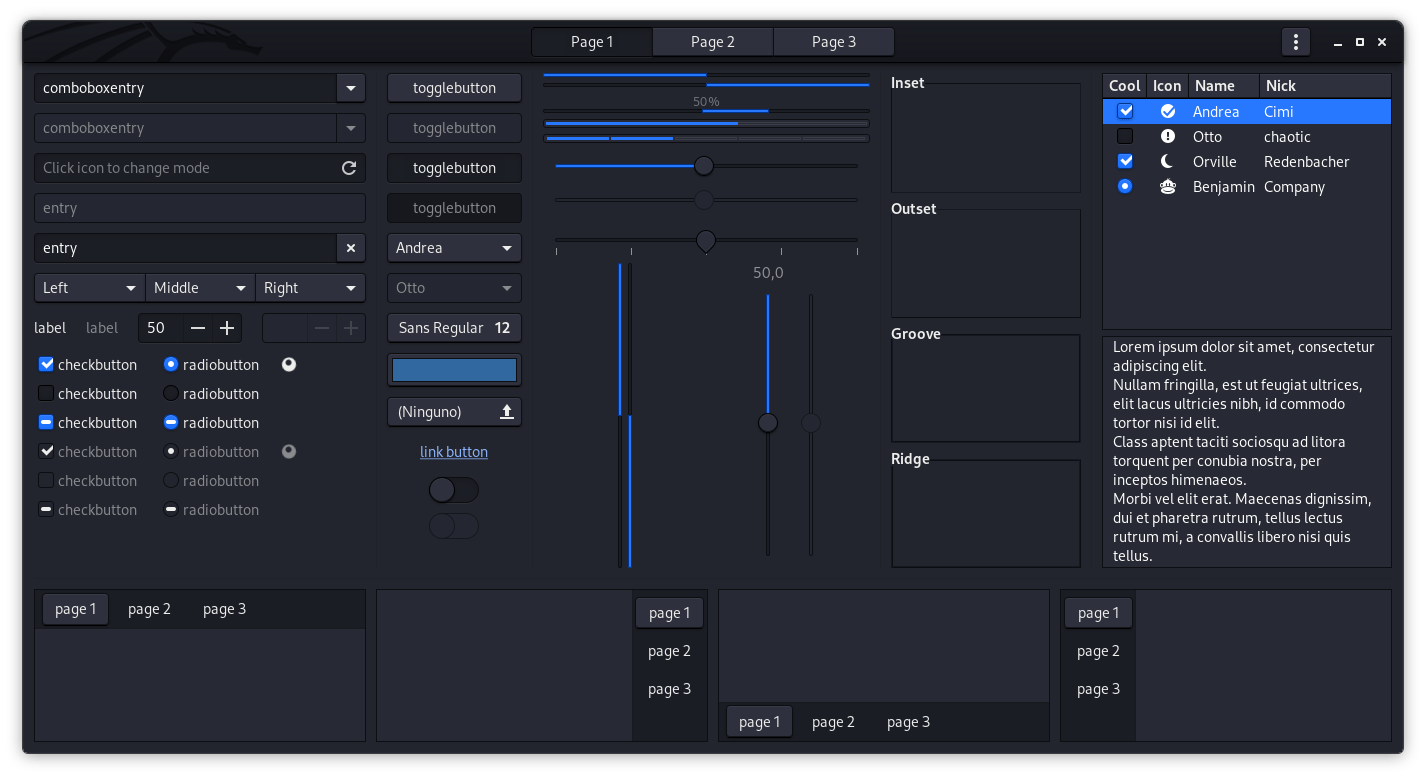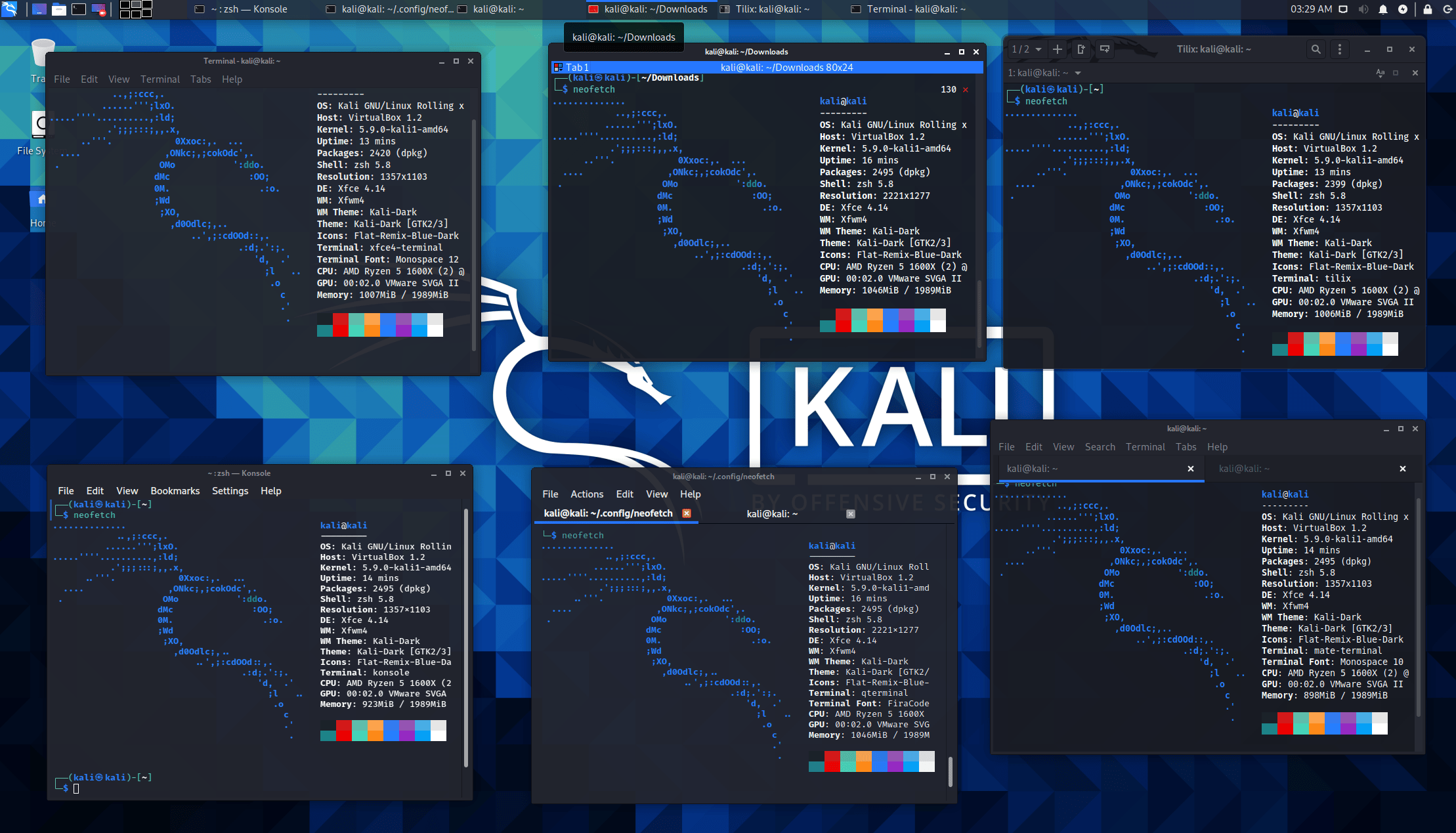New tools in Kali Linux 2021.1 Release (Command-Not-Found)

Reading Time: 1 Minute
Kali Linux release of the year with Kali Linux 2021.1. This edition brings enhancements of existing features, and is ready to be downloaded or upgraded if you have an existing Kali Linux installation.
The summary of the changelog since the 2020.4 release from November 2020 is:
- Xfce 4.16 – Our preferred and current default desktop environment has been updated and tweaked
- KDE 5.20 – Plasma also received a version bump
- Terminals –
mate-terminal,terminatorandtilixall had various work carried out on them - Command Not Found – A helping hand to say if a program needs to be installed
- Partnership with more tool authors – BC Security & Joohoi have been producing great tools and we want to support them
- New tools & updates – Multiple new tools have been added to Kali and are ready for you
- Kali NetHunter – New BusyBox & Rucky version, and boot-animation
- Kali ARM – Preliminary support for Parallels on Apple Silicon (Apple M1) & Raspberry Pi 400 (WiFi Support)
The Kali project itself also has a couple different changes:
- New Kali website – You may have noticed a few things looking different
- Kali newsletter – Rather than you coming to us for updates, we can push them to your inbox
Xfce & KDE Updates
How you choose to interact with Kali is completely up to you. You may want to access Kali locally or remotely, either graphically or on the command line. Even when you pick a method, there are still options you can choose from, such as a desktop environment.
By default, Kali uses Xfce, but during the setup process, allows for GNOME, KDE, or no GUI to be selected. After the setup is complete, you can install even more. We have pre-configurations for Enlightenment, i3, LXDE, and MATE as well.
So when a desktop environment gets an update, they often enhance day-to-day activities for their users. It’s best to hear it straight from the authors, for a tour of what’s changed:
Below is our tweaked GTK3 theme, on Xfce:
style=”display:block” data-ad-client=”ca-pub-6620833063853657″ data-ad-slot=”8337846400″ data-ad-format=”auto” data-full-width-responsive=”true”>
Terminals Tweaks
When we use Kali, we spend a significant amount of time using the command line. A lot of the time, we do it using a local terminal (rather than in a console or remote SSH). With the options of desktop environments, there are also choices when it comes to the terminals (same with what shell to use). We have been working away on various terminals (xfce4-terminal, tmux, tilix, konsole, qterminal, and mate-terminal) to “Kali-fy” them:
Finding Commands That Didn’t Want To Be Found
A while ago, we changed the default set of tools installed in Kali. Most users know they can either install a one-off package, or revert back to the old set of defaults (apt install kali-linux-large). But to help communicate our changes (as well as any new tools), we have now included command-not-found by default. This is an “optional” package, which can be removed without removing all of kali-linux-default.
Without command-not-found installed:
┌──(kali㉿kali)-[~]
└─$ gitleaks
gitleaks: command not found
If you are wondering “How does this help me?”, or has the above ever happened to you, we like to think people’s next stage would be to do apt-cache search gitleaks and see it in the network repositories. But we can do better. Now with command-not-found:
┌──(kali㉿kali)-[~]
└─$ gitleaks
Command 'gitleaks' not found, but can be installed with:
sudo apt install gitleaks
┌──(kali㉿kali)-[~]
└─$ gitleakss
Command 'gitleakss' not found, did you mean:
command 'gitleaks' from deb gitleaks
Try: sudo apt install <deb name>
┌──(kali㉿kali)-[~]
└─$ badcmd
badcmd: command not found
As you can see from the above example:
gitleaks– If the command you entered is the name of an executable available in Kali, it will say the package that you need to install (if its not already!)gitleakss– If you are “fat fingered” and make a typo, it may make a suggestionbadcmd– If you typed in an invalid command that doesn’t exist in Kali, it will give the original message of “command not found”.
See Also: Offensive Security Tool: ScareCrow
So, how can I get this magic? Good question! If you’re:
- Doing a fresh install of Kali Linux 2021.1 or later, it will “just happen” during the setup.
- Updating Kali and you are using a Bash shell, then it will “just happen” too.
- Updating Kali and you are using a Zsh shell, you will need to add the following lines to your
~/.zshrc:
# enable command-not-found if installed
if [ -f /etc/zsh_command_not_found ]; then
. /etc/zsh_command_not_found
fi
But it doesn’t have to end here. By adding COMMAND_NOT_FOUND_INSTALL_PROMPT=1 to your shell’s environment (e.g. ~/.bashrc or ~/.zshrc), command-not-found will take it one step further, and also prompt you if you want to install the missing package. This change is something we will be putting in in a future release.
Hope it helps!
Partnerships with Tools Authors
Carrying on from our previous partnership with byt3bl33d3r, we have expanded to supporting:
- BC Security – Giving Kali exclusive early access to “Empire” (
powershell-empire) & “StarKiller” - Joohoi – The creator of “Fuzz Faster U Fool (ffuf)”
The announcement with Joohoi is new for Kali 2021.1. Like the previous sponsorships, you can either sponsor him directly to get the latest access to ffuf, use Kali Linux, or wait 30 days until the source code becomes public. However, he has also announced anyone who makes a significant contribution, which gets accepted into the project, also gets access!
style=”display:block” data-ad-client=”ca-pub-6620833063853657″ data-ad-slot=”8337846400″ data-ad-format=”auto” data-full-width-responsive=”true”>
See Also: Hacking Stories: Albert Gonzalez & the ‘Get Rich or Die Trying’ Crew who stole 130 million credit-card numbers
New Tools in Kali
It wouldn’t be a Kali release if there weren’t any new tools added! A quick run down of what’s been added (to the network repositories):
- Airgeddon – Audit wireless networks
- AltDNS – Generates permutations, alterations and mutations of subdomains and then resolves them
- Arjun – HTTP parameter discovery suite
- Chisel – A fast TCP/UDP tunnel over HTTP
- DNSGen – Generates combination of domain names from the provided input
- DumpsterDiver – Search secrets in various filetypes
- GetAllUrls – Fetch known URLs from AlienVault’s Open Threat Exchange, the Wayback Machine, and Common Crawl
- GitLeaks – Searches Git repo’s history for secrets and keys
- HTTProbe – Take a list of domains and probe for working HTTP and HTTPS servers
- MassDNS – A high-performance DNS stub resolver for bulk lookups and reconnaissance
- PSKracker – WPA/WPS toolkit for generating default keys/pins
- WordlistRaider – Preparing existing wordlists
Happy hacking!
style=”display:block” data-ad-client=”ca-pub-6620833063853657″ data-ad-slot=”8337846400″ data-ad-format=”auto” data-full-width-responsive=”true”>
style=”display:block” data-ad-client=”ca-pub-6620833063853657″ data-ad-slot=”8337846400″ data-ad-format=”auto” data-full-width-responsive=”true”>
Source: www.kali.org
(Click Link)





